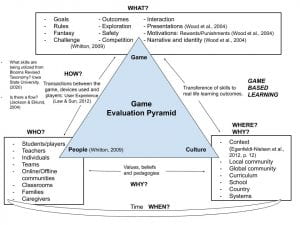Part C: Reflection
When I first posted the Assessment 1 blog task for this course I never would have expected to be sitting here in my study on a Monday (instead of teaching in my classroom), undertaking my 10th week of online teaching and learning for my first-grade class. Google Meet and online platforms have become our new educational normal. If we are ever to have an opportunity to reshape what education means and can look like in the 21st century the time is now. The use of games for the development of 21st-century skills is something I know I will be implementing into future lesson plans (see video below).
(Extra Credits. 2014)
A challenge I listed in the assessment 1 blog post was to refute claims that “technology can be detrimental to learning”. I think the current environment has helped to do this for me, for without the technology we currently are able to access there would be no online learning able to occur. The stigma of ‘screen time’ is very much at the forefront of media as students worldwide access their classroom materials online from students in Kindergarten all the way up to University level.
During this online learning period I have certainly been able to see more clearly which families of my class value GBL as a form of learning. It’s sad, but many of my students are “not allowed” to play certain games that I have told them they can use, for example Prodigy (written about in Assessment 2). Some reasons I believe for this is that it could be cultural reasons (Korea holds ROTE learning in high regard within their Confucian education values) or I need to be more explicit in my communication and provide articles to help back me up. This is difficult with the language barrier. A primary reason for teachers not wanting to use GBL in their classrooms is due to push-back from parents (Bourgonjon, Valcke, Soetaert, de Wever, & Schellens, 2011). I feel like I am more equipped to deal with whatever push-back may come through my learning in this course and I am more confident to be able to speak about it with parents who may be concerned. In the future I would introduce my classroom philosophy with reference to GBL at the beginning of the school year so parents might know what to expect.
This course has given me the push I needed to step out of my comfort zone and try new platforms for teaching and learning. I finally started playing Minecraft for Education (see video below for some inspiration I found in this course) and am in the midst of exploring ways I can use this for the last 3 weeks of our online learning for Project-Based Learning. I have been able to apply my new knowledge of game characteristics to lesson plans for online learning and my students have been able to code and create from a distance!
(McTammany, 2013)
If I was to choose one core lesson to take away with me to continuously reflect on it is that “Teachers always embody pedagogical values and assumptions on learning that may or may not be successfully integrated with particular game designs” (Hanghøj, 2013). As games are such a diverse media form I need to be able to think outside of myself and my own assumptions when it comes to implementing GBL. I will probably keep using the framework I created from my own understandings in assessment 2 (pictured below) to continue to help me decode and take apart games and their characteristics to reflect on if it will work in whatever future classroom context that may come.
References
Bourgonjon, J., Valcke, M., Soetaert, R., de Wever, B., & Schellens, T. (2011). Parental acceptance of digital game-based learning. Computers & Education, 57(1), 1434-1444. doi:https://doi.org/10.1016/j.compedu.2010.12.012
Extra Credits. (2014, May 14). Education: 21st Century Skills- How games prepare you for life- Extra Credits [Video file]. Retrieved from https://www.youtube.com/watch?v=0hoeAmqwvyY
Hanghøj, T. (2013). Game-based teaching: Practices, roles, and pedagogies. In S. de Freitas, M. Ott, M. Popescu, & I. Stanescu (Eds.) New pedagogical approaches in game enhanced learning: Curriculum integration (pp. 81-101). Hershey, PA: doi:10.4018/978-1-4666-3950-8.ch005
McTammany, B. (2013, February 24). Minecraft is fun [Video file]. Retrieved from https://www.youtube.com/watch?v=aLJtJbBSiuQ

